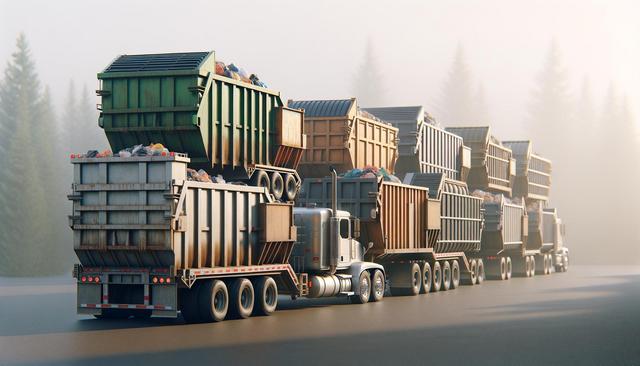Understanding Dumpster Trailers and Their Core Benefits
Dumpster trailers are mobile waste containers mounted on wheels, designed to be hauled by trucks or other towing vehicles. Unlike stationary dumpsters, these trailers provide increased flexibility in terms of placement, movement, and usage. Their design allows users to load and transport a variety of materials in one trip, making them a valuable asset for both residential and commercial projects. The ability to move a trailer to different locations makes it particularly useful for jobs that cover multiple sites or require efficient debris removal on the go.
One of the primary advantages of dumpster trailers is their ease of use. They often sit lower to the ground compared to roll-off dumpsters, simplifying the loading process—especially for heavy or awkward items. Additionally, many models come with hydraulic dump features, enabling a quick and safe unloading process. This combination of mobility and functionality makes dumpster trailers a practical tool for contractors, landscapers, event organizers, and homeowners tackling major clean-outs.
Applications Across Industries
Dumpster trailers serve a wide array of industries thanks to their adaptable design. In construction and renovation work, they are commonly used to haul away demolition debris, scrap materials, and packaging waste. Landscaping businesses rely on them to transport yard waste, soil, gravel, and equipment. Even event planning companies use them to manage post-event cleanup efficiently.
Here are a few common applications:
- Home renovation projects: removing drywall, flooring, and fixtures
- Estate clean-outs: hauling furniture, appliances, and personal items
- Roofing jobs: disposing of shingles and underlayment
- Agricultural use: transporting feed, fencing, or debris from fields
- Community cleanups: collecting trash, recyclables, or brush
Their wide usage demonstrates how dumpster trailers provide value beyond traditional waste disposal, acting as mobile transport solutions for a variety of materials and tasks.
Key Features and Customization Options
Modern dumpster trailers come with a variety of features that enhance their performance and usability. From adjustable axles to weather-resistant coatings, these additions cater to different operational needs. Common sizes range from 10 to 30 cubic yards, accommodating both small residential jobs and large-scale commercial projects.
Popular features include:
- Hydraulic dump systems for effortless unloading
- Removable side panels for easier access
- Tandem axles for heavier loads
- Locking lids for secure transport
- Integrated ramps for equipment loading
Additionally, some manufacturers offer customization options such as branding decals, specialized linings for certain waste types, or reinforced flooring for heavy-duty use. These features ensure that dumpster trailers can be tailored to fit specific operational requirements, enhancing both efficiency and safety.
Comparing Dumpster Trailers to Traditional Dumpsters
When comparing dumpster trailers to traditional roll-off dumpsters, several distinctions become apparent. While both serve the purpose of waste containment and removal, dumpster trailers provide mobility and versatility that stationary dumpsters lack. This can be especially useful in areas with limited space or where access needs to change throughout a project.
Key differences include:
- Mobility: Trailers can be attached and moved as needed
- Loading height: Lower profiles make loading easier
- Surface damage: Trailers are less likely to damage driveways than heavy roll-offs
- Permit requirements: Often fewer restrictions for trailers in residential areas
These distinctions make dumpster trailers a preferred choice for many users who need an adaptable and user-friendly waste solution. They are particularly appealing for short-term jobs or ongoing projects that require frequent relocation of waste containers.
Choosing the Right Dumpster Trailer for Your Needs
Selecting the right dumpster trailer depends on a few key factors, including the type and volume of material to be hauled, the terrain of the worksite, and the capabilities of the towing vehicle. For instance, a landscaping business might prioritize trailers with ramp access and medium capacity, while a construction site may need a heavy-duty model with a hydraulic dump system and reinforced sides.
Key considerations include:
- Size and capacity: Match the trailer size to the volume of expected waste
- Towing compatibility: Ensure your vehicle can safely haul the loaded trailer
- Material type: Some trailers are better suited for specific materials like concrete or green waste
- Frequency of use: Consider durability and ease of maintenance for frequent use
Consulting with a trailer dealer or rental provider can help narrow down your options. Many companies offer flexible rental terms or purchase plans to suit different budget levels and project timelines.
Conclusion: Why Dumpster Trailers Are a Smart Investment
Dumpster trailers offer a practical, flexible, and efficient solution for a variety of hauling and disposal tasks. Whether you’re managing a construction site, cleaning up a property, or running a landscaping business, their mobility and functionality can simplify operations and reduce downtime. With a wide range of sizes, features, and customization options, they provide an adaptable tool that suits both occasional users and daily operators. For anyone looking to streamline waste management or improve logistics on-site, exploring the utility of dumpster trailers is a step in the right direction.






